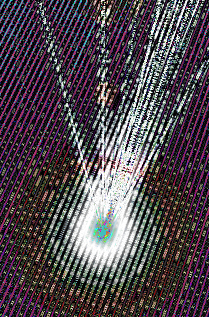Blockchains prepped for quantum assault
 Researchers are working on ways to protect one new technology from another technology that barely exists.
Researchers are working on ways to protect one new technology from another technology that barely exists.
When full-scale quantum computers arrive, most maths-based encryption methods will become simple to solve. This is because quantum processing is capable of going over almost infinite mathematical possibilities in the blink of an eye.
As well as encryption, the next-gen computer should make light work of the maths that underpins Bitcoin and other cryptocurrencies, leaving them vulnerable to attacks.
A team of researchers from the University of Technology Sydney (UTS) thinks this will become and active threat in as little as 10 years from now, and so have started working on measures to improve digital currency security.
Researchers from Sydney and Singapore have produced a white paper, 'Quantum attacks on Bitcoin and how to protect against them', that describes how digital currencies could become vulnerable to attack, with disastrous effect if thieves equipped with quantum computers steal funds without detection.
The potential is that trust in this rapidly growing market – today estimated to be worth US$150 billion – could erode rapidly as a result.
“Many existing Bitcoin accounts and all new transactions will be at risk within 10 years, so we need to start thinking about solutions now,” says Dr Marco Tomamichel from the new Quantum Resistant Coin (QRC) research group.
The QRC team has considered the point at which quantum computers could potentially jeopardise the security of current cryptocurrencies, and have assessed counter-measures to such attacks.
They also assess the risk of quantum-dominated mining in so-called Proof of Work protocols, which are the basis for verifying transactions in Bitcoin and many other cryptocurrencies.
“It is a very exciting time to be working in quantum information now that simple quantum machines, like the Google and IBM devices, are a reality,” says Dr Tomamichel.
“Understandably, there is a lot of nervousness in cryptocurrency communities about whether their digital assets can resist future attacks by very fast quantum computers.”








 Print
Print